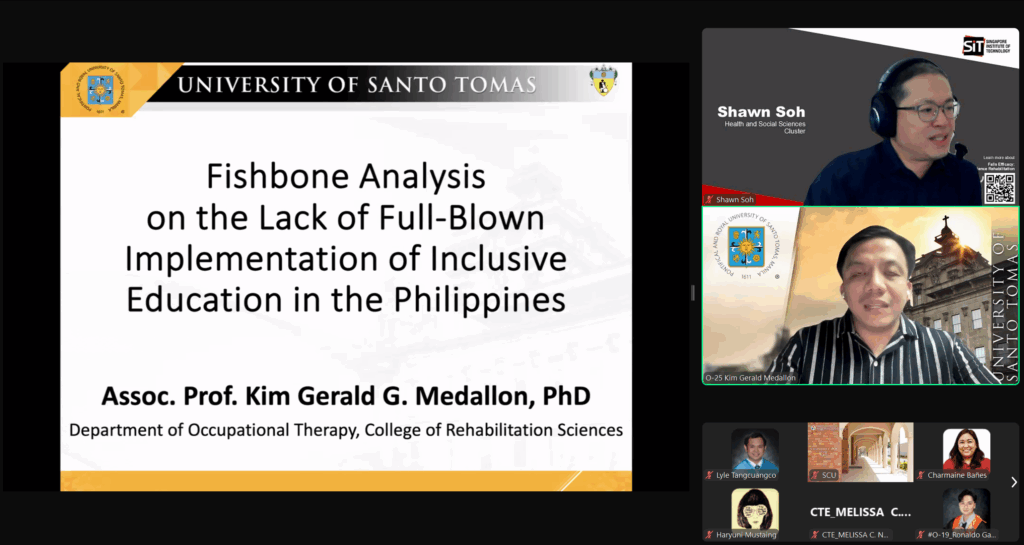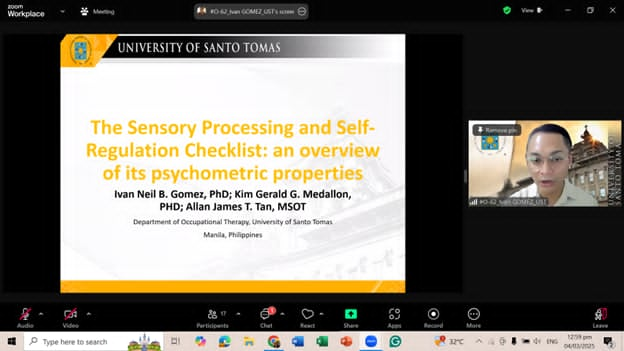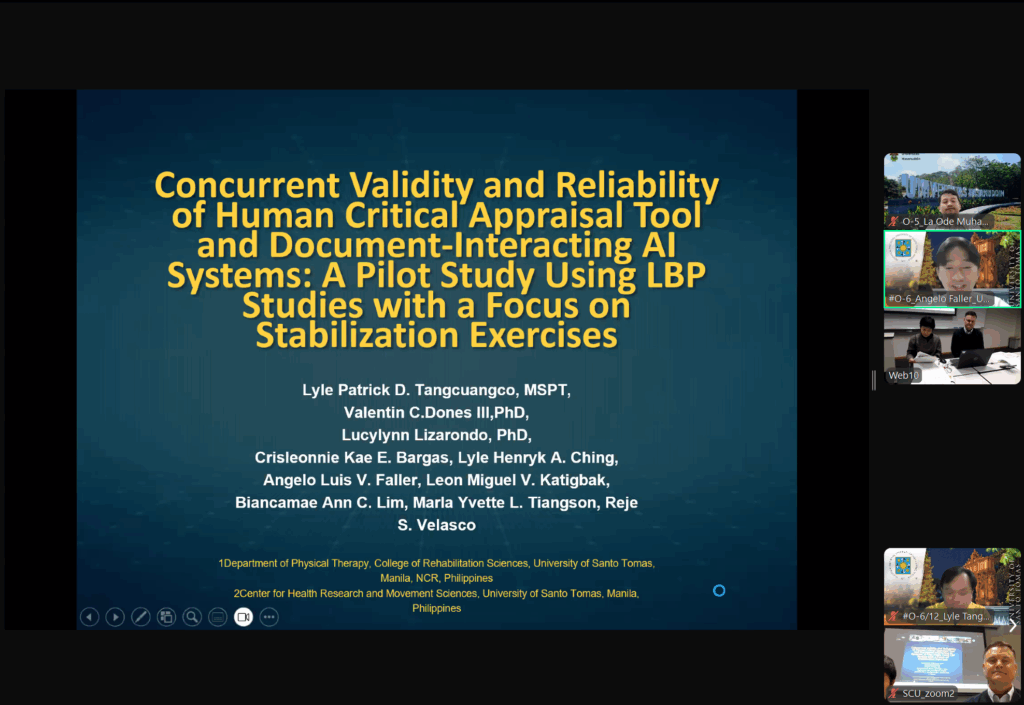


The University of Santo Tomas proudly showcased its growing research influence at the Seirei International Research Conference 2025 (SIRC 2025). The virtual conference was held last March 3 to 4, 2025, hosted by Seirei Christopher University in Hamamatsu, Japan. The theme of this year’s conference focused on fostering global collaboration in health sciences.
Representing UST’s College of Rehabilitation Sciences (CRS) and the Center for Health Research and Movement Science (CHRMS), academic staff from the Departments of Physical Therapy, Asst. Prof. Lyle Patrick Tangcuangco, MSPT, PTRP, and Occupational Therapy, Assoc. Prof. Ivan Neil Gomez, Ph.D., Asst. Prof. Allan James Tan, MSOT, and Assoc. Prof. Kim Gerald G. Medallon, Ph.D., OTRP, along with their respective student researchers, delivered insightful oral presentations on topics that deal with local and global health as well as education contexts.
Medallon presented his study, “Fishbone Analysis on the Lack of Full-Blown Implementation of Inclusive Education in the Philippines.” The study called for comprehensive disability awareness initiatives and strengthened interprofessional collaboration to address the systemic gaps in adopting inclusive education, creating a pathway for policymakers, educators, and other stakeholders towards creating inclusive educational environments in the Philippines.
Gomez, alongside his co-authors Medallon and Tan, presented their narrative review titled, “The Sensory Processing and Self-Regulation Checklist (SPSRC): an overview of its psychometric properties.” Gomez contributed to the development and validation of the original SPSRC and the translation and testing of the English, Tagalog, and Italian versions. Their research underscores the importance of having culturally adapted and psychometrically sound assessment tools to enhance occupational therapy practices globally.
Tangcuangco and his research team presented “Postural Risks Associated with Tablet Use When Studying Among College of Rehabilitation Sciences Students: An Observational Cross-Sectional Study.” CRS student Koffi Esmile shared that the research evaluated the ergonomic risks linked to prolonged tablet use among CRS students; their team used the Rapid Upper Limb Assessment (RULA) tool in identifying issues in one’s posture which may have negative long-term health implications for students in prolonged study sessions. Their participation emphasized the importance of equipping students with the right strategies to protect their postural health while using digital devices in academics, merging postural health with academic practice.
In another presentation, Tangcuangco’s team also shared the results of the study titled, “Concurrent Validity and Reliability of Human Critical Appraisal Tool and Document-Interacting AI Systems: A Pilot Study Using LBP Studies with a Focus on Stabilization Exercises,” with student researcher Angelo Luis V. Faller delivering the presentation.
This pioneering pilot study assessed the reliability of various Document-Interacting AI Systems (DIAiS)—including ChatPDF, SciSpace, ChatGPT-4, Gemini, and ClaudeAI—in critically appraising randomized controlled trials (RCTs) focusing on low back pain (LBP) interventions. The study compared these AI systems with expert human appraisers using the JBI Revised RCT Tool, analyzing agreement levels through Cohen’s Kappa and Fleiss Kappa statistics.
Findings revealed that while DIAiS tools show promising capabilities in assisting with research appraisal, none could fully match human experts’ accuracy and critical depth. Among the systems tested, ClaudeAI and SciSpace demonstrated the highest reliability. The research underscores the growing potential of AI in academic research while highlighting the need for further refinement before DIAiS can be confidently integrated into high-stakes evidence-based practices.
These presentations by CRS academic staff and students at SIRC2025 reflect the university’s ongoing dedication to producing research that addresses relevant challenges across health, education, and rehabilitation sciences. From embracing technological innovations like artificial intelligence to promoting ergonomic awareness and advancing inclusive education, these studies demonstrate the college’s commitment to interdisciplinary, solution-driven research.
Future research will focus on expanding these studies into larger-scale projects, developing innovative interventions, and fostering partnerships that translate academic findings into real-world impact for communities in the Philippines and beyond.
By actively participating in global academic forums like SIRC 2025, CRS and CHRMS affirm their place at the forefront of rehabilitation sciences research—leading the way in transforming knowledge into action and strengthening the university’s role as a catalyst for positive change.SIRC 2025 served as an international platform for scholars, practitioners, and students to share innovative research addressing critical issues in healthcare, education, and social welfare.




